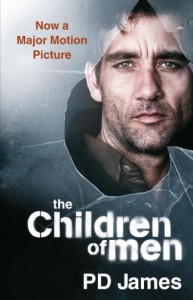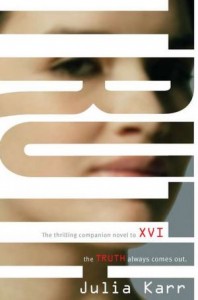 The Children of Men, by P.D. James
The Children of Men, by P.D. James
Rating: 3 out of 5
Summary: The year is 2021 and mankind is on the brink of extinction. The last generation has reached adulthood and despite fertility testing and years of scientific research, mankind remains infertile. Mass suicides are on the rise as the citizens of England begin to lose hope. Theodore Faron, an Oxford historian, is stuck in the past. He would rather remember his unhappy past then think about the future-less future. Until he is approached by Julian, an attractive, smart woman who wants him to help her and her group of revolutionaries, the Five Fish, convince Theo’s cousin, the Warden of England, to step down and let someone else rule the country. As Theo becomes more involved with the group, he begins to realize that his future may not be so hopeless as he discovers that the Five Fish have a secret that could mean the survival of the human race.
While this is not really a YA novel, I’ve noticed that a lot of people on GoodReads who enjoy YA dystopians have added this book to their to-read lists. Personally, I have wanted to read this book for a long time because I loved the 2006 movie adaptation. Unfortunately, very quickly into the book I realized that the movie adaptation was a very loose adaptation. About the only similarities are the main concept and the character names. Otherwise, they may as well be two completely different stories with more or less different plot lines and characters.
The Good
James’ writing is, without a doubt, beautiful. She uses interesting words in interesting ways and her use of description is quite good. The characters, for the most part, are interesting with a healthy dose of weaknesses. Theo has an interesting story and he grows throughout in ways that seem believable. Miriam and Julian were also interesting and I found myself wanting to know more about their backgrounds. I wish Luke and Rolf, the other members of the Five Fish, had been equally as developed. Xan, the Warden of England, was also well portrayed. Despite his weaknesses, I did not find him to be completely bad and, even though I knew his success would mean the failure of the hero, I was conflicted about wanting him to fail. I kept hoping that a compromise could be found. I think this shows that James successfully created her characters because you should always feel something for both the hero and the villan.
The plot, while slow at times, kept me guessing. James moved the plot in interesting ways and made good use of surprises. Even when things seemed predictable, I still found myself engaged in seeing how the predictable parts would come to pass.
Finally, the general concept is intriguing. I loved seeing how James painted a world on the brink of destruction, seeing the different responses and how different people dealt with the inevitable end and the failure of mankind to reproduce, something so innate and something that other, seemingly more inferior beings like cats, are still able to do.
The Not so Good
The book is written in third person with pages from Theo’s diary added in to provide his background. It was an interesting convention, but I was not overly fond of it. It almost seemed like an easy way to give us the background into Theo’s life. I would have preferred learning about his life throughout the flow of the novel. His diary entries bordered on boring and, were it not for the fact that I enjoyed the movie so much, I probably would not have been able to make it through this book.
The book did not really get interesting for me until about 200 pages in. The book only has about 250 pages. I’m not sure if seeing the movie, which was so very different, made me enjoy the book less than I would have otherwise or if it made me enjoy it more.
While I didn’t love the book, I am happy that I read it. P.D. James is a lovely writer and she made an interesting exploration into mankind’s nature and how we would deal with such an inevitable end.




